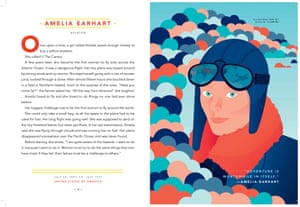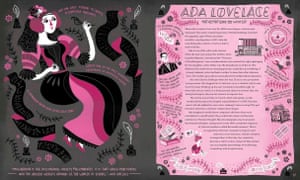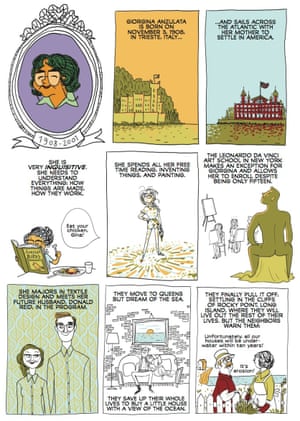Read like a girl: how children’s books of female stories are booming
By Alison Flood
Good Night Stories for Rebel Girls and Fantastically Great Women Who Changed the World are just two of a raft of inspirational titles changing bedtime reading
Studies in the past have found that children’s books are dominated by male characters, that history books are overrun by male authors writing about male figures, and that literary fiction is less likely to win a prize if it focuses on a female character.
A new wave of books aimed at children might just be doing its small bit to change that. Thousands of little girls – boys as well, but likely mainly girls – will be settling down for bed this evening with a new kind of bedtime story, one in which the heroines are not fictional, but real. From Good Night Stories for Rebel Girls to Fantastically Great Women Who Changed the World, sales of books about inspirational women have boomed this year – and look set to grow.
Kate Pankhurst – a distant relative of the suffragette Emmeline – has sold more than 52,000 copies of her guide to the Fantastically Great Women Who Changed the World, according to book sales monitor Nielsen BookScan. Elena Favilli and Francesca Cavallo, meanwhile, didn’t have high expectations when they launched a Kickstarter last year for Good Night Stories For Rebel Girls, which tells the stories of 100 “extraordinary” women, from Malala Yousafzai to Michelle Obama. They wanted to raise $40,000 (£31,000), and to print 1,000 copies. But their Kickstarter became the most-funded publishing campaign on the site, raising more than $1m. The self-published book has since sold more than 500,000 copies around the world.

“I didn’t at all expect it to sell so much,” says Pankhurst of her book. “I didn’t anticipate the interest from parents that was out there, but it’s been really lovely to see people enjoying it. It’s a real discussion point for families – a way in to talking about the stories of these women, and to talking about the broader point of why the book is only about women, if they have been forgotten from history.”
She believes readers are responding, in some way, to the darkness of current affairs. “There is so much in the news at the moment about a regressive attitude to women and to diversity, and I think there is a real appetite for writing to show the better side of humankind, its inspirational stories. To say: ‘This is the way things should be,’” she says.
“There is a vacuum our books are filling,” agrees Favilli. “We live in a time when gender stereotyping, and equal rights, and empowering young girls is very important and is happening internationally. People are eager to find different kinds of content to consume with their children.”
Feminism in books is currently experiencing crossover appeal in both adult and children’s fiction, with novels unpicking the role of women in society also shooting up the charts. Off the back of regressive gender politics in the US and a hit TV adaptation, Margaret Atwood’s 1985 classic The Handmaid’s Tale has sold almost 150,000 copies this year, and this year’s Baileys prize winner, Naomi Alderman’s The Power, has sold more than 80,000. And Favilli’s UK editor Casiana Ionita – 500,000 sales later – believes some of the success of Good Night Stories comes from adults, who recognise it is as a book they would have liked as children. “We have heard from people buying it for themselves, or for their friends … it is OK for grownups to like this book: most of us wish we’d had something like it growing up. And we get lots of fathers reading it with their daughters.”
Father-and-children’s book blogger Phil May, who runs ReaditDaddy, is one of them. “It feels like the last four years or so have seen a huge rise in inspirational girl books. Certainly in 2016 and 2017 we’ve seen more ‘mighty girl’ titles than any other year,” he says. He attributes their astronomical rise to a number of factors: “Renewed interest in space exploration, for example, means that girls as well as boys … not only want to hear about the women who are working in space science today, but the women who helped contribute to hugely important advances in space exploration. Knowing who people like Helen Sharman and Valentina Tereshkova are is vitally important for girls who are no longer satisfied with being palmed off with rubbish [suggesting] ‘space is for boys, why would girls be interested in that stuff?’”

Bookshops are pushing other titles like Girls Think of Everything by Catherine Thimmesh, Chelsea Clinton’s just-published She Persisted, about 13 American women who changed the world, and Women in Science, a collection by Rachel Ignotofsky looking at 50 female scientists, which has sold more than 15,000 copies to date.
And there is more to come, with Ionita saying she’s seen a lot of proposals because “a lot of people are keen on doing more in this sphere”. Next month, the young adult novel about suffragettes, Things a Bright Girl Can Do, by the award-winning Sally Nicholls, arrives on shelves; after that, space expert Libby Jackson’s Women in Space (about “50 inspirational women who have been fundamental to the story of humans in space”) comes out in November. Then next March, the comic book Brazen: Rebel Ladies Who Rocked the World, arrives on shelves. And Pankhurst is working on a follow-up: Fantastically Great Women Who Made History, which will feature names including the suffragette Flora Drummond (“she hired a barge to pull up outside the Houses of Parliament and shouted slogans at MPs having tea on the lawn”), and the dancer and civil rights activist Josephine Baker.

And Christmas brings another follow-up: Good Night Stories For Rebel Girls 2, covering women from Nefertiti to Beyoncé, which has raised $866,193 on Kickstarter to date (yet again, substantially more than its $100,000 goal).
“Books about inspirational women have been a welcome and much needed addition to our bookshelves,” says Waterstones children’s buyer Florentyna Martin, praising Pankhurst’s book, which has remained a bestseller for the chain since it was published last year, as well as Good Night Stories. “It’s important to recognise that these titles are shaping a sustainable area of children’s books and not just ‘bestsellers for the moment’. These books are required, to inspire younger generations for years to come … and the older ones too.”
“For me as a dad of a daughter, it feels like the first time that people have actively stood up to the rubbishy old sexist viewpoints of particular careers or branches of interest being dominated by gender,” says May. “It’s been a stunning few years for these types of books. Long may it continue.”
